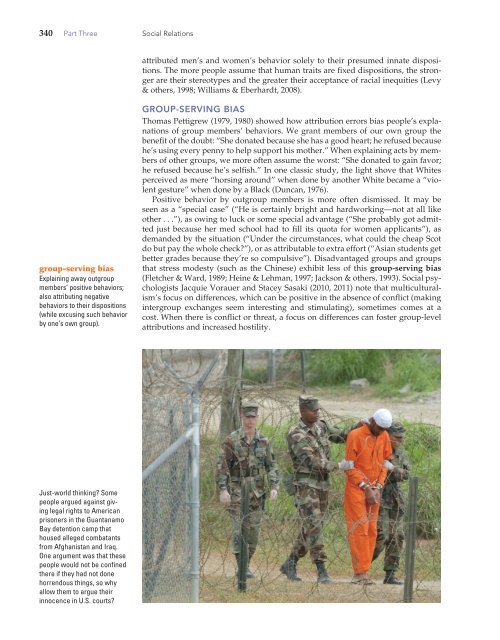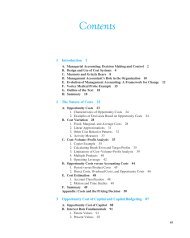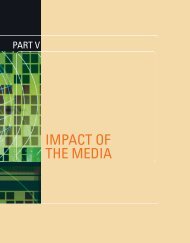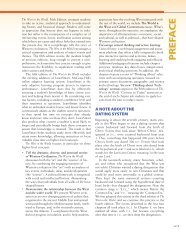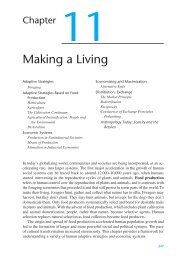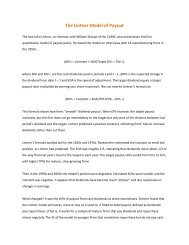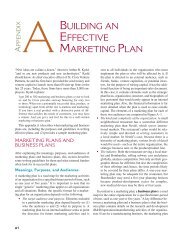Chapter 9: Prejudice: Disliking Others (2947.0K) - Bad Request
Chapter 9: Prejudice: Disliking Others (2947.0K) - Bad Request
Chapter 9: Prejudice: Disliking Others (2947.0K) - Bad Request
You also want an ePaper? Increase the reach of your titles
YUMPU automatically turns print PDFs into web optimized ePapers that Google loves.
340 Part Three Social Relations<br />
group-serving bias<br />
Explaining away outgroup<br />
members’ positive behaviors;<br />
also attributing negative<br />
behaviors to their dispositions<br />
(while excusing such behavior<br />
by one’s own group).<br />
Just-world thinking? Some<br />
people argued against giving<br />
legal rights to American<br />
prisoners in the Guantanamo<br />
Bay detention camp that<br />
housed alleged combatants<br />
from Afghanistan and Iraq.<br />
One argument was that these<br />
people would not be confined<br />
there if they had not done<br />
horrendous things, so why<br />
allow them to argue their<br />
innocence in U.S. courts?<br />
attributed men’s and women’s behavior solely to their presumed innate dispositions.<br />
The more people assume that human traits are fixed dispositions, the stronger<br />
are their stereotypes and the greater their acceptance of racial inequities (Levy<br />
& others, 1998; Williams & Eberhardt, 2008).<br />
GROUP-SERVING BIAS<br />
Thomas Pettigrew (1979, 1980) showed how attribution errors bias people’s explanations<br />
of group members’ behaviors. We grant members of our own group the<br />
benefit of the doubt: “She donated because she has a good heart; he refused because<br />
he’s using every penny to help support his mother.” When explaining acts by members<br />
of other groups, we more often assume the worst: “She donated to gain favor;<br />
he refused because he’s selfish.” In one classic study, the light shove that Whites<br />
perceived as mere “horsing around” when done by another White became a “violent<br />
gesture” when done by a Black (Duncan, 1976).<br />
Positive behavior by outgroup members is more often dismissed. It may be<br />
seen as a “special case” (“He is certainly bright and hardworking—not at all like<br />
other . . .”), as owing to luck or some special advantage (“She probably got admitted<br />
just because her med school had to fill its quota for women applicants”), as<br />
demanded by the situation (“Under the circumstances, what could the cheap Scot<br />
do but pay the whole check?”), or as attributable to extra effort (“Asian students get<br />
better grades because they’re so compulsive”). Disadvantaged groups and groups<br />
that stress modesty (such as the Chinese) exhibit less of this group-serving bias<br />
(Fletcher & Ward, 1989; Heine & Lehman, 1997; Jackson & others, 1993). Social psychologists<br />
Jacquie Vorauer and Stacey Sasaki (2010, 2011) note that multiculturalism’s<br />
focus on differences, which can be positive in the absence of conflict (making<br />
intergroup exchanges seem interesting and stimulating), sometimes comes at a<br />
cost. When there is conflict or threat, a focus on differences can foster group-level<br />
attributions and increased hostility.


